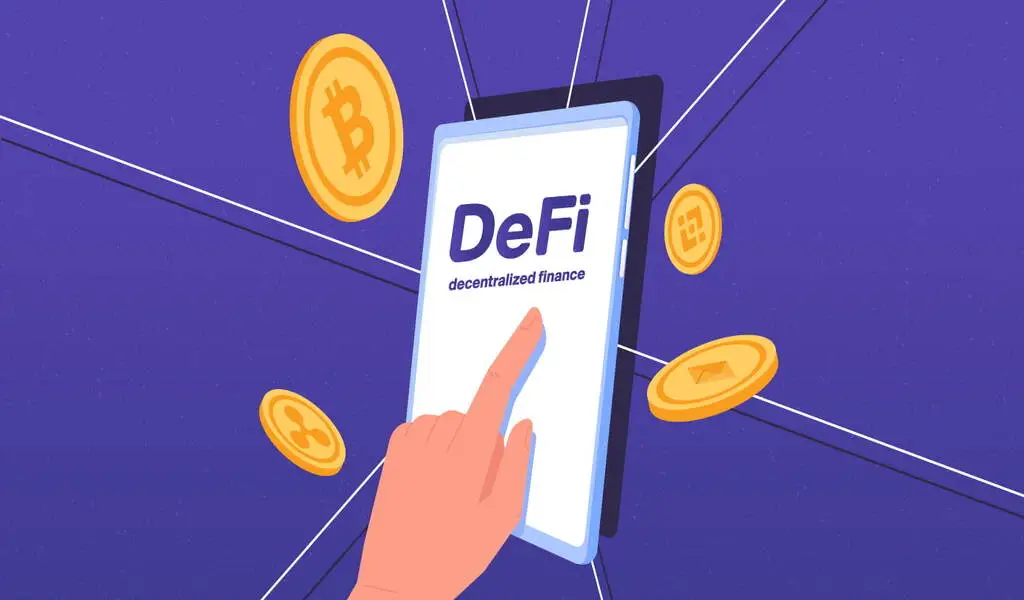Amidst the dynamic advancements in financial technology, one standout innovation that has garnered widespread acclaim. Functioning as a navigational aid within the expansive Ethereum network, this tool plays a pivotal role in simplifying complex processes.
At the heart of Ethereum’s progressive ecosystem lies Decentralized Finance (DeFi), a transformative concept with the potential to overhaul conventional financial services, promote inclusivity, and revolutionize our fundamental understanding of currency.
DeFi has emerged as a disruptive and groundbreaking influence within the realm of blockchain technology, propelling a wave of change.
This comprehensive article takes an in-depth plunge into the intricate fabric of Ethereum’s DeFi realm, meticulously examining its fundamental elements, its array of advantages, the hurdles it faces, and the far-reaching possibilities it holds for reshaping the very foundations of the financial sector.
If you are curious about Ethereum, it’s essential to understand the role of decentralized finance (DeFi) in the Ethereum ecosystem.
The Genesis of DeFi
Decentralized Finance, commonly referred to as DeFi, is an innovative paradigm that aims to transform traditional financial services into trustless, open-source, and accessible protocols that operate on blockchain technology. Ethereum, a versatile blockchain platform known for its smart contract capabilities, serves as the cornerstone of this burgeoning ecosystem.
Understanding DeFi’s Pillars
Smart Contracts: The Building Blocks
At the heart of Ethereum’s DeFi movement lies the concept of smart contracts. These self-executing contracts run on the Ethereum blockchain, automating complex financial processes without the need for intermediaries.
Through the power of code, smart contracts enable the creation of various financial instruments, including decentralized lending, borrowing, and trading platforms.
Decentralized Exchanges (DEXs): Redefining Trading
Decentralized exchanges have emerged as a hallmark of the DeFi ecosystem. Unlike traditional exchanges that rely on central authorities, DEXs operate autonomously through smart contracts, ensuring peer-to-peer trading without relinquishing custody of funds.
This shift towards self-custody empowers users with unprecedented control over their assets while reducing the risks associated with centralized exchanges.
Yield Farming and Liquidity Mining: Incentivizing Participation
DeFi introduces novel concepts like yield farming and liquidity mining, where users can earn rewards by providing liquidity to various DeFi protocols. These mechanisms not only incentivize user participation but also contribute to the liquidity and stability of the DeFi ecosystem, driving its growth.
Synthetic Assets: Expanding Investment Horizons
Synthetic assets are another remarkable facet of DeFi. These tokens replicate the value of real-world assets, allowing users to gain exposure to traditional financial instruments like stocks, commodities, and even fiat currencies, all within the decentralized realm. This innovation not only diversifies investment opportunities but also enhances accessibility for users worldwide.
Benefits and Potential Disruptions
Democratizing Financial Services
DeFi’s true power lies in its potential to democratize financial services. By eliminating intermediaries, DeFi protocols can provide access to financial products and services to the unbanked and underbanked populations, bridging the gap between traditional finance and emerging markets.
Enhanced Transparency and Security
Blockchain’s immutability ensures that transactions within the DeFi ecosystem are transparent and tamper-proof. This transparency, coupled with robust security measures, reduces the risk of fraud and manipulation, fostering greater trust among users.
Redefining Ownership and Control
DeFi grants users unprecedented ownership and control over their financial activities. With self-custody of assets and the ability to engage directly with smart contracts, individuals can navigate the financial landscape without relying on intermediaries, thereby minimizing fees and delays.
Challenges on the Path Forward
Scalability and Network Congestion
As the popularity of DeFi continues to surge, Ethereum’s network faces scalability challenges, leading to congestion and high transaction fees. Layer 2 solutions and the upcoming Ethereum 2.0 upgrade aim to address these issues, but the journey to seamless scalability is ongoing.
Regulatory Uncertainty
The regulatory environment surrounding DeFi remains uncertain in various jurisdictions. Striking a balance between innovation and compliance poses a significant challenge for the ecosystem, as it strives to ensure user protection without stifling growth.
The Road Ahead
Ethereum’s DeFi universe stands at the crossroads of disruption and transformation. Its potential to reshape financial services, enhance accessibility, and redefine ownership is undeniable.
As the ecosystem matures, collaborations between DeFi projects, regulatory bodies, and traditional financial institutions will likely pave the way for a harmonious integration of decentralized and centralized finance.
Conclusion
In summary, Ethereum’s DeFi ecosystem stands as a compelling demonstration of blockchain technology’s remarkable potential to reshape the financial realm.
By harnessing the capabilities of smart contracts, decentralized exchanges, and inventive financial tools, DeFi not only provides a tantalizing preview of a future characterized by genuine accessibility, transparency, and personalized authority over financial affairs, but also offers a profound departure from conventional norms.
As the boundaries of Ethereum’s DeFi universe continue to extend, its far-reaching influence is poised to etch a significant and enduring imprint on the intricate fabric of the worldwide financial landscape.
⚠ Article Disclaimer
The above article is sponsored content any opinions expressed in this article are those of the author and not necessarily reflect the views of CTN News






